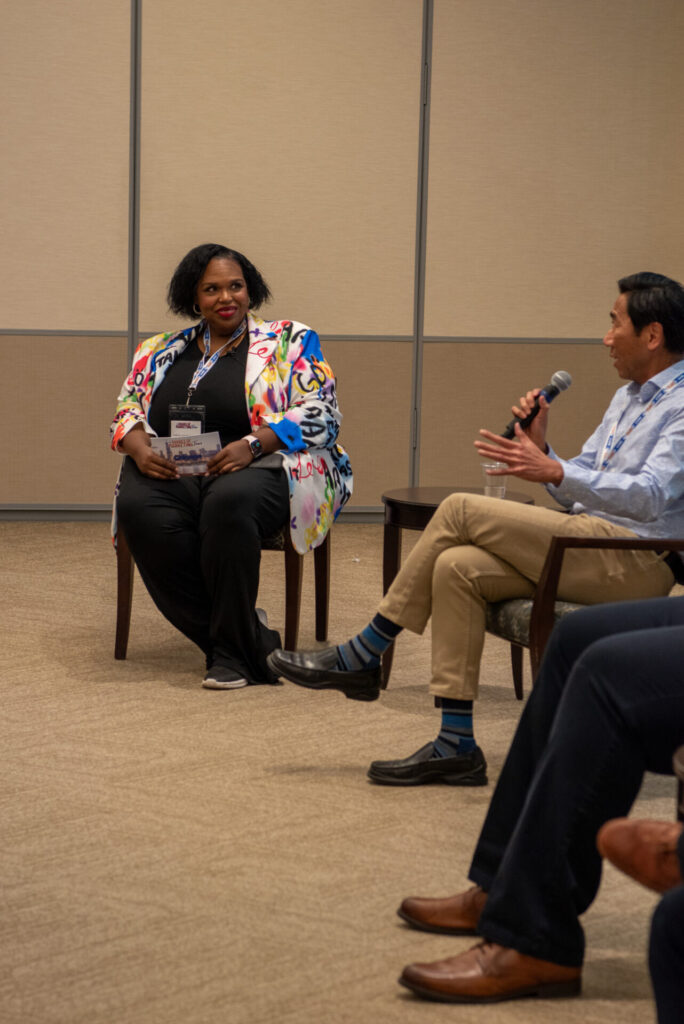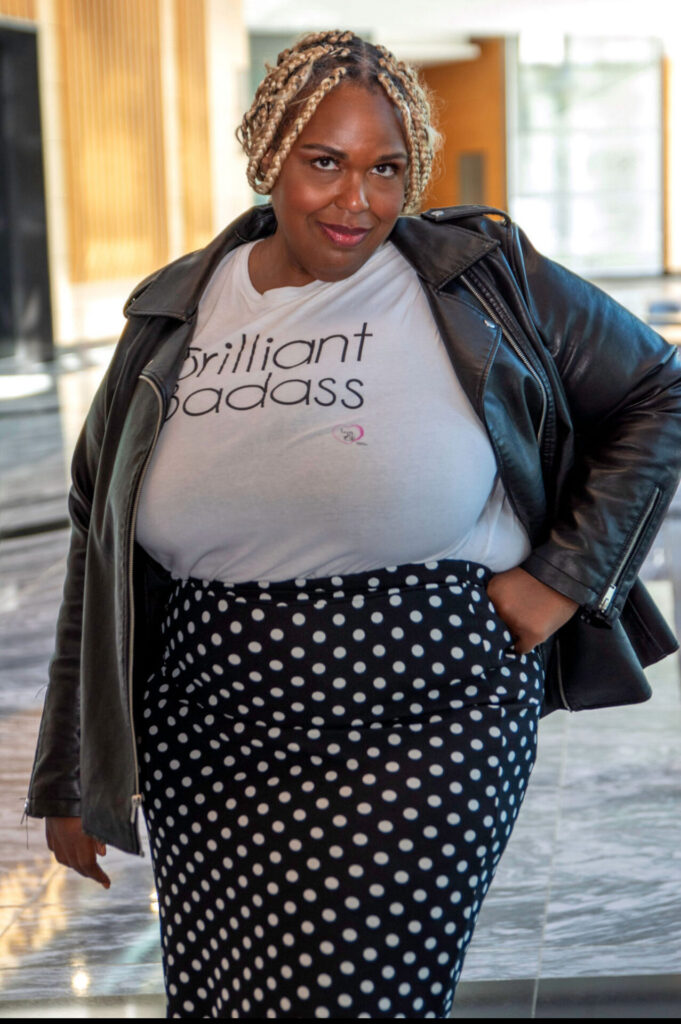Not a day goes by that Felicia Ann Rose Enuha, speaker, comedian and host of Trill MBA Show, a career management podcast for Black Women, isn’t looking for the answers to questions that plague Black women in the workplace: “Why am I being passed up for promotions?” “Is there a safe work environment for Black women?” “Should I get another degree?” “My Boss doesn’t like me; how do I fix it?”
Through her podcast, she tries to answer these kinds of questions by interviewing Black women and letting them share their experiences – without judgement – to work thorugh common issues. Stories told on her show provide listeners with examples of failures, hurts, triumphs and ways to pivot into new careers, so they know they aren’t alone on their respective career paths. She has one-on-one sessions, where Enuha counsels corporate clients and helps them devise strategies for success.
“My whole message for Black women is a message of: how do we survive and thrive in these spaces, but hold onto as much peace, as much truth and as much freedom for ourselves as we can?”
With a slight Texas accent, she tells her listeners and clients that the key to thriving in these cubicle streets lies within. Once they understand themselves, they will also become more aware of others.
“You need to craft a strategy based on who you are, based on how you want to show your truth, and based on who this company is and what their expectation is of somebody who looks like you.”
Most of the Black women she speaks with are struggling in some form or fashion, but there are definitely success stories of those who are able to build a clear pathway to success brick-by-brick without the need for human resources, Equal Employment Opportunity Commission (EEOC) and an attorney on standby.
Enuha says the key to this success is self-awareness.

“Every human being has to hold themselves accountable to be truly self-aware in every sense of the word. So, situationally self-aware, internally self-aware, externally self-aware.”
She takes it a step further: “There are personality types who very strongly can’t check themselves. That’s why you get an Elon Musk. That’s why you get a Jeff Bezos. They are doing all these things to feel important when the reality is there is no such thing as human importance. We’re all important.”
This concept was something she struggled with early in her career, and she knew that if she desired success, she needed to change.
“It was driven by having to deal with other human beings and not understanding why I perceived myself one way, but then I would get this forced feedback, because it’s the workplace, and they are telling me who I am.”
She was trying to assert herself as a leader and felt the need to put on a certain persona. In those moments, she was unaware of how she was being experienced and perceived. After receiving feedback that she had a “strong personality”, she realized that while she thought she was coming across as a competent and strategic leader, she wasn’t managing the perceptions of those whose thoughts mattered the most. She wasn’t self-aware and she didn’t have a plan.
She cautions that many Black women are mostly focused on the work and not on relationships, more importantly, heeding the clues and hints that a manager, business partner or co-worker is upset. Once they notice there is an issue, Enuha says it’s often too late to fix the problem.
“Many don’t know what to look for, don’t know the signs. Your work is impeccable, but there’s that, ‘she’s (manager) not happy’, but everyone else around you is giving you so much good feedback about your work.”
In these instances, there could be something that the manager is upset about unbeknownst to the employee who may ignore the signs that something is wrong.

“I want us to get radically confrontational about when your Spidey senses kick up. It’s typically something we ignore. We tell ourselves, ‘No, that doesn’t make sense, I’m being paranoid’. But when your Spidey senses kick in, and you feel like you got three data points that are subtle: your boss is canceling one-on-ones, or your boss is starting to email you more when she used to pick up the phone or what your boss said on the phone is different from what she emailed.”
These are the instances where Enuha pushes her clients to set up a meeting with their manager and ask questions.
“That’s our mode for attack. Our mode of attack is through questioning, because you’re not going to see me coming if I’m asking you a question, and I’m going to ask you a question in a way that backs you into a corner. So now you have to agree with what I am saying, even if you don’t really want to, or you have to show your hand and you don’t want to do that.”
She admits that becoming self-aware is work.
“It’s hard because I shouldn’t have to spend any intellectual or emotional energy worried about, ‘Oh I offended somebody, or am I going to offend somebody’ – that’s a lot of energy that cuts into productivity. And the problem with these workplaces is that nobody wants to recognize the emotional labor that is happening, that is taking away from actual work productivity – especially for people of color, specifically for Black women.”
Black women are the reason she wanted to provide these outlets, and why she will continue on this journey.
“I started the podcast because there are people I recognize, and they just want to work. They want to go to work, they want to be rewarded for the work they do and the value they contribute, and they want to go home. And for those people, I want to make sure they have peace in their work life so they’re not bringing home chaos, that they get to live more in their truth, and their authenticity and that they feel free to grow, learn and explore.”
